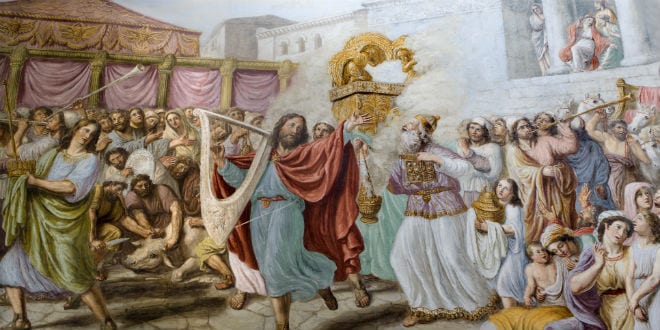My family and I watched the TV series “House of David,” which was number one on Amazon. It had many disappointments but occasionally pleased when the writers somehow remembered to quote the Biblical narrative.
Finally, the long-drawn-out series reached the point when David slays the giant.
1 Samuel 17:40 from the Masoretic Text, as found in the Westminster Leningrad Codex:
וַיִּקַּח מַקְלוֹ בְּיָדוֹ וַיִּבְחַר לוֹ חֲמִשָּׁה חַלֻּקֵי אֲבָנִים מִן הַנַּחַל וַיָּשֶׂם אֹתָם בִּכְלִי הָרֹעִים אֲשֶׁר לוֹ בַּיַּלְקוּט וְקַלְּעוֹ בְיָדוֹ וַיִּגַּשׁ אֶל הַפְּלִשְׁתִּי
. . . . translates roughly to: “And he took his staff in his hand, and chose for himself five smooth stones from the stream, and put them in the shepherd’s pouch that he had, in the bag, and his sling was in his hand, and he approached the Philistine.”
In 1 Samuel 17:43, Goliath mocks David, saying, “Am I a dog, that you come at me with sticks?” The plural “sticks” is interesting here, and it’s likely a scornful exaggeration or a reference to what Goliath perceived as David’s feeble weapons. At that point, David was approaching with his shepherd’s staff in hand since the aforementioned 1 Samuel 17:40 notes that he took his staff, sling, and stones, unimpressive gear which Goliath ridiculed compared to his own massive weapons.
1 Samuel 17: 42 also notes, “And when the Philistine looked and saw David, he disdained him, for he was but a youth, ruddy and handsome in appearance.” Unfortunately, the TV series poorly cast the actor, not as ruddy, and not handsome. Pity!
Naturally, I was infuriated that the script writers had David temporarily downed and wounded since that fantasy is not in the Bible.
But I did enjoy seeing him bravely running toward the giant, as the text says, in 1 Samuel 17:48-51, “As Goliath came near to attack him, David ran quickly to meet him. He took a stone from his bag, put it into his sling, and slung it. The stone hit the Philistine and went deep into his forehead, and Goliath fell facedown on the ground.”
So, while David didn’t rely on the staff (or “stick”), nor on King Saul’s armor, Goliath’s trash talk highlighted his underestimation of the shepherd boy. The staff was part of David’s shepherd identity, not his battle plan—Goliath just seized on it to flex his bravado before the sling shut him down. David used his sling because it was a proven weapon for him.
David’s reliance was on the name of the LORD. Let that be a lesson for all of us! 1 Samuel 17: 45, “And David says to the Philistine, ‘You are coming to me with sword, and with spear, and with buckler, and I am coming to you in the Name of YHWH of Hosts, God of the ranks of Israel, whom you have defied!”
The rabbinic sages offer a variety of interpretations and insights into the famous narrative, often focusing on the details of David’s preparation to face Goliath and drawing out moral, spiritual, and symbolic meanings.
While the biblical text itself is straightforward, the sages’ commentaries—found in sources such as the Talmud, Midrash, and later rabbinic writings—tend to elaborate on the narrative to highlight David’s faith, ingenuity and divine favor.
Here’s a synthesis of some key rabbinic perspectives:
The Staff as a Symbol of Humility and Reliance on God:
The sages note that David took his shepherd’s staff (מַקְלוֹ, maqlo), a simple tool of his trade, rather than a weapon of war. In Midrash Tehillim (a midrash on Psalms), some connect this to David’s humility and trust in God rather than in human strength or conventional arms. The staff, a sign of his lowly shepherd status, contrasts with Goliath’s imposing armor and weaponry, underscoring the theme that God elevates the humble. This aligns with Goliath’s taunt in verse 43 (“Am I a dog, that you come at me with sticks?”), which the sages see as Goliath misjudging David’s true power—his faith.
The Five Smooth Stones and Their Significance:
The choice of five smooth stones (חֲמִשָּׁה חַלֻּקֵי אֲבָנִים, chamishah challuqe avanim) sparks considerable discussion. One whimsical yet illustrative tale in Midrash Tanchuma suggests that the stones “called out” to David from the stream, eager to be used against Goliath, symbolizing divine orchestration. More practically, the Talmud (Sotah 42b) and other sources imply David’s readiness to conquer multiple foes, linking the five stones to Goliath and his four brothers. (This calculation is based on 2 Samuel 21:18-22, which mentions Goliath’s kin).
Rashi, a prominent medieval commentator, doesn’t explicitly tie the number five to Goliath’s family but emphasizes the stones’ smoothness as ideal for slinging—reflecting David’s skill and preparation.
David’s Shepherd Identity and Messianic Foreshadowing:
The sages often see David’s use of shepherd tools—staff, pouch (יַּלְקוּט, yalqut), and sling (קַלְּעוֹ, qal‘o)—as a deliberate choice to fight as a shepherd, not as a warrior. In Midrash Rabbah on Genesis (e.g., Genesis Rabbah 59:11), David’s shepherding is tied to his role as a future king and a prototype of the Messiah, who will shepherd Israel (cf. Psalm 78:70-72). The simplicity of his gear in 1 Samuel 17:40 is interpreted as evidence that God chooses the unassuming to confound the mighty, a recurring theme in Jewish thought.
Goliath’s Miscalculation and Divine Justice:
Goliath’s mockery of the “sticks” ties into rabbinic reflections on his arrogance. In Pirkei de-Rabbi Eliezer (Chapter 43), some sages suggest that Goliath’s taunt blinded him to David’s real weapon—the sling—allowing David to catch him off guard. This is seen as divine justice: Goliath’s pride (and his exposed forehead, per later verses) made him vulnerable to a shepherd boy’s stone. The sages connect this to Proverbs 16:18, “Pride goes before destruction, and a haughty spirit before a fall.” Indeed, the scene of Goliath’s toppling and crashing fall was well produced in the series.
Practical Skill vs. Divine Intervention:
While the text highlights David’s practical preparation (choosing smooth stones for accuracy), the sages balance this with his reliance on God. The Talmud (Berakhot 58b) and Midrash Shmuel praise David’s sling expertise—common among shepherds protecting flocks—but stress that his victory was miraculous. The stones’ flight and Goliath’s fall are often attributed to divine guidance, not just David’s aim, reinforcing the idea that “the battle is the Lord’s.” (1 Samuel 17:47)
Commentaries portray David in 1 Samuel 17:40 as both a skilled youth and a divinely chosen figure, whose modest tools became instruments of God’s will. Throughout his career he cut off enemies in the Name of the LORD. Let us do the same!
To contact Christine Darg, visit www.JerusalemChannel.tv





